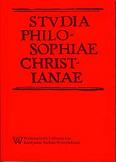Czy dusza ludzka jest indywidualna? Kontrowersje wokół rozumienia duszy w starożytnym neoplatonizmie niechrześcijańskim
Is the human soul individual? – a discussion of the nature of the soul in ancient nonchristian Neoplatonism
Author(s): Tomasz StępieńSubject(s): Philosophy
Published by: Wydawnictwo Naukowe Uniwersytetu Kardynała Stefana Wyszyńskiego w Warszawie
Keywords: Neoplatonism; Plotinus; Amelius; Porphyry; Iamblichus; soul; monopsychism
Summary/Abstract: Understanding the human soul was one of the basic problems discussed by ancient philosophers. The most important issue concerning the relation of the soul to the human body was widely considered in Plato’s dialogues. Discussion of this issue arose once again among Neoplatonists during the last period of pagan philosophy. In Plotinus’ Enneads and the writings of his pupils we can observe that discussion of the nature of the soul and its relationship to body is linked to the problem of how the soul can be individual. Plotinus underlined the perfection of the soul and diminished the role of the human body and at the same time he explained the origins of intellectual reality by the theory of procession of hypostases. As a result he claimed that the primal state of the soul is hypostasis of the soul, which leads to monopsychism, which in the case of Plotinus was neither clear nor radical. It was his pupil, Amelius, who formulated the radical monopsychic idea. At the same time, the second of Plotinus’ closest pupils, Porphyry, made an attempt to reconcile the individuality of the soul with its almost absolute independence of the body. The growing influence of Aristotle and his theory of the substantial unity of the body and soul made the rejection of monopsychism possible. This influence most notable in the writings of Iamblichus, who agreed first, that connection with the body is substantial. His accordance with Aristotle was possible only thanks to theurgical rites, practiced by neoplatonic philosophers. The idea of substantial unity caused inevitable claims of the mortality of the soul united in this way with the body. Nevertheless, thanks to theurgical rites, immortality could be regained and the individual character of the human soul could be claimed without rejecting its immortality. Although monopsychism did not return in Neoplatonism, it did resurface in some form in the writings of Arabic medieval thinkers, who were well acquainted with neoplatonic commentaries on Aristotle.
Journal: Studia Philosophiae Christianae
- Issue Year: 48/2012
- Issue No: 1
- Page Range: 87-104
- Page Count: 18
- Language: Polish

